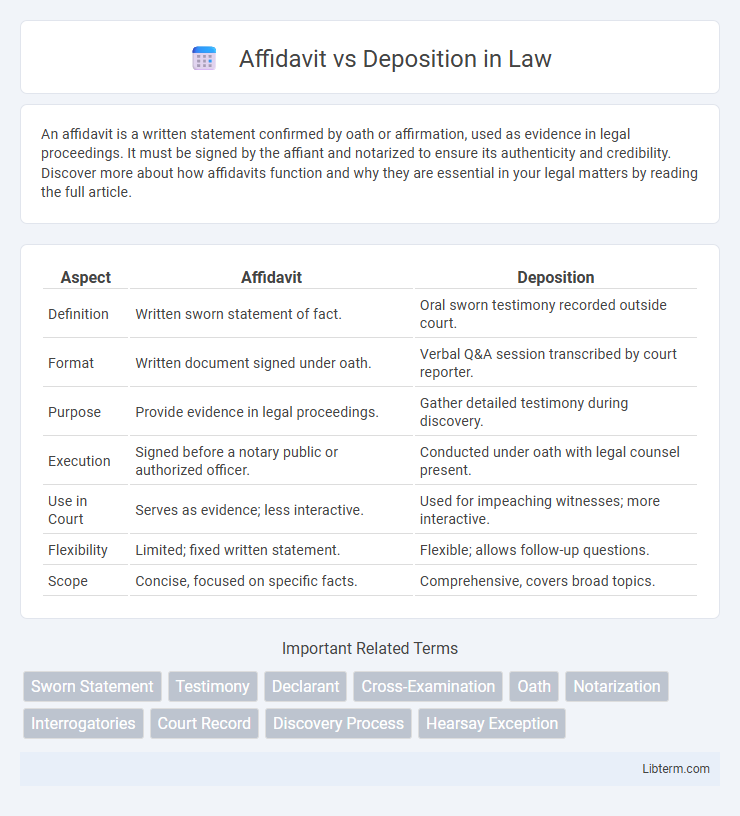An affidavit is a written statement confirmed by oath or affirmation, used as evidence in legal proceedings. It must be signed by the affiant and notarized to ensure its authenticity and credibility. Discover more about how affidavits function and why they are essential in your legal matters by reading the full article.
Table of Comparison
| Aspect | Affidavit | Deposition |
|---|---|---|
| Definition | Written sworn statement of fact. | Oral sworn testimony recorded outside court. |
| Format | Written document signed under oath. | Verbal Q&A session transcribed by court reporter. |
| Purpose | Provide evidence in legal proceedings. | Gather detailed testimony during discovery. |
| Execution | Signed before a notary public or authorized officer. | Conducted under oath with legal counsel present. |
| Use in Court | Serves as evidence; less interactive. | Used for impeaching witnesses; more interactive. |
| Flexibility | Limited; fixed written statement. | Flexible; allows follow-up questions. |
| Scope | Concise, focused on specific facts. | Comprehensive, covers broad topics. |
Introduction: Understanding Affidavits and Depositions
Affidavits are written statements sworn under oath, typically used as evidence in legal proceedings without requiring the witness's physical presence. Depositions involve oral testimony given under oath, recorded by a court reporter, allowing attorneys to question witnesses before trial for fact-finding and impeachment purposes. Both affidavits and depositions serve crucial roles in gathering and preserving evidence within the judicial process.
Defining an Affidavit
An affidavit is a written statement confirmed by oath or affirmation, used as evidence in legal proceedings. It is signed by the affiant and notarized by an authorized officer, ensuring its authenticity and reliability. Unlike a deposition, an affidavit is prepared outside of court without verbal questioning or cross-examination.
What Is a Deposition?
A deposition is a sworn out-of-court testimony given by a witness or party to a lawsuit, recorded for later use in court proceedings. It allows attorneys to gather detailed information, evaluate witness credibility, and preserve testimony before trial. Depositions typically involve oral questioning under oath, with a court reporter transcribing the entire session verbatim.
Key Differences Between Affidavit and Deposition
An affidavit is a written, sworn statement used as evidence in court, signed by the affiant in the presence of a notary public or authorized officer. A deposition involves a live, oral testimony given under oath, typically recorded by a court reporter and used for discovery before trial. The key difference lies in the format and setting: affidavits are written documents, whereas depositions are interactive, allowing for cross-examination and clarification.
Legal Purposes: When to Use Each
Affidavits serve as written sworn statements used primarily for court filings and evidentiary support in legal proceedings, providing a concise, verified account of facts. Depositions involve sworn, out-of-court testimonies taken during the discovery phase, allowing attorneys to question witnesses and gather detailed verbal evidence under oath. Use affidavits when a formal, static statement is required for motions or affidavits, and depositions when interactive testimony and cross-examination are necessary to prepare for trial.
Procedures for Creating Affidavits and Depositions
Affidavits are written statements made under oath, typically prepared by the affiant and notarized to verify authenticity, often submitted as evidence without live testimony. Depositions involve sworn, out-of-court oral testimony recorded by a court reporter, allowing attorneys to question witnesses before trial, with a transcript created for use in court. Both procedures require strict adherence to legal standards for oath administration, witness identification, and accurate record-keeping to ensure evidentiary validity.
Admissibility in Court: Affidavit vs Deposition
Affidavits and depositions differ significantly in their admissibility in court; affidavits are written statements sworn under oath but may be challenged for lack of cross-examination, while depositions are live, sworn testimonies recorded with the opportunity for immediate cross-examination. Courts often prefer depositions over affidavits for evidence because depositions allow for direct assessment of witness credibility and reliability through questioning. In civil litigation, affidavits are typically admissible to support motions or summary judgments, but depositions carry greater evidentiary weight during trials due to their procedural rigor and opportunity for challenges.
Who Can Participate in Affidavits and Depositions?
Affidavits can be authored solely by the affiant, who provides a sworn written statement, typically notarized by an authorized official such as a notary public or commissioner of oaths. Depositions involve participation by the deponent, who answers oral questions under oath, along with attorneys from both parties and a court reporter to transcribe the testimony. Judges are generally not present during depositions, while affidavits do not require direct involvement from opposing counsel during their creation.
Common Mistakes and Pitfalls
Confusing affidavits with depositions often leads to mistakes such as underestimating the formality and legal weight of each document, with affidavits being written sworn statements and depositions involving live, oral testimony under oath. Failing to understand that affidavits are typically used to present evidence in court without cross-examination can result in overreliance on them, while neglecting the dynamic nature of depositions which allow for immediate questioning and clarification. Overlooking procedural errors like improper notarization of affidavits or inadequate preparation for depositions can invalidate critical evidence and weaken legal strategies.
Choosing the Right Legal Statement for Your Case
Choosing the right legal statement depends on the purpose and context of your case, as affidavits are sworn written statements used to present evidence quickly, while depositions involve live, recorded sworn testimonies during pre-trial discovery. Affidavits provide concise, formal assertions that simplify evidence submission, whereas depositions allow for detailed questioning and cross-examination to uncover factual nuances. Understanding the strategic role of affidavits and depositions supports effective case preparation and strengthens legal arguments.
Affidavit Infographic

 libterm.com
libterm.com